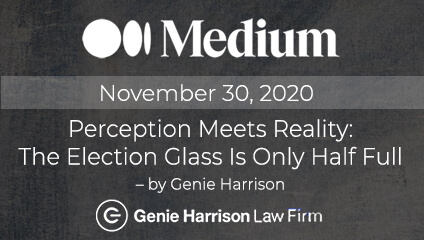Perception Meets Reality: The Election Glass Is Only Half Full
Nov. 30, 2020 — by Genie Harrison for Medium.com
(Read the story below, or here at Medium.com)
With election 2020 almost behind us, Democrats have found themselves in the proverbial glass half-full/half-empty paradigm. The voting populace have elected a leader whom they believe epitomizes the key qualities needed at this moment: compassion, empathy, integrity and a true moral compass. At his side will be the nation’s first black, Indian woman vice president, someone who has spent her life pursuing equality and justice for all.
Black women especially, but African Americans generally, along with the tribes, delivered the election results. But the promised policies that convinced voters to elect the Biden/Harris ticket are unlikely to be implemented with an unbalanced Senate, the makeup of which now hangs in the balance at 48–50 in favor of the Republicans.
The two Senate seats subject to run-off are both in Georgia. Senate candidates Rev. Raphael G. Warnock and Jon Ossoff are running against Republican incumbents David Perdue and Kelly Loeffler. Loeffler’s name came up in the course of an insider trading case earlier this year; Perdue continues to deal with his own insider trading case. If Warnock and Ossoff win, there will be a 50–50 tie in the Senate and then-Vice President Kamala Harris will be the tie-breaking vote. Without a Senate tie, most of the critical changes sought by 78+ million voters simply will not be achievable by the Biden/Harris administration.
In the middle of Barack Obama’s first term in office, Senate Majority Leader Mitch McConnell made clear his party’s agenda: Make Obama a one-term president. During Obama’s second term, Republicans consistently blocked his judicial appointments and much significant legislation. Obama repeatedly strove for compromise, including offering market-based systems to expand health insurance and combat climate change, but he could not win Republican votes.
This unwillingness to cross the aisle in the interest of the American people started long before Obama. House Speaker Newt Gingrich established “us-vs-them” as the modus operandi of his party, and his cohorts quickly fell into line, demonstrating uniform unwillingness to work with Presidents Clinton and Obama on issues ranging from climate to taxes to health care. The American people have paid a steep price for this partisanship and intransigence, which Mitch McConnell has signalled he will perpetuate if given the chance as Senate Majority leader during a Biden presidency.
As we near the end of the Trump presidency, we see gaping wounds that cry out for healing. The economy is in shambles, coronavirus deaths are at a record high, the environment is on the brink of catastrophe, racial inequalities are in the spotlight, and democratic institutions have been severely undermined. Without surgical intervention, including life-saving interventions in the legislative intensive care unit, these institutions may be hard-pressed to recover.
November 3 is history (and historic). The next make-or-break date on the national calendar will be January 5, when the Senate run-off elections take place in Georgia. The implications of these races cannot be overstated. Voters in Georgia who want to see meaningful legislation on coronavirus, climate change, criminal justice and more must educate themselves on the candidates’ positions and turn out to vote in record numbers once again.
Without a balance in the Senate, Biden will need one or more Republican votes to pass any bill, something that will be extremely difficult to achieve. McConnell, who is now calling into question the result of a free and fair election, campaigned for reelection as a check against Biden policies, promising to block significant policy efforts as majority leader. His Senate colleagues will likely keep their toes on that line even if it means a bad outcome for their constituents. Under these circumstances, very little of legislative import would get done over the next two years.
It shouldn’t happen this way. When the tables were turned — when Democrats held the majority during Republican presidencies — bipartisan coalitions enacted significant legislation on issues such as Medicare, economic stimulus packages and education. Moderates on both sides of the aisle were willing to put aside their differences in the public interest.
Biden’s election was a message that the voters want decency, a focus on workers and important policy changes, but those changes are not promised. Instead, the policy initiatives promised by Biden and Harris now hinge on Georgia’s senatorial seat run-off elections. If Georgians want the progress for which they voted in the presidential election, they must turn out for the January 5 election in record numbers.





